#App Privacy
Text
Tumblr plese kindly stop @staff we come here to get away from Google and Facebook. And that branch metrics is the worce

#privacy#app privacy#plese stop#tumblr#bullshit#duck duck go#net neutrality#data breach#big data#data#evil#be better
6 notes
·
View notes
Text

(Edit 2: Closing replies for this and muting the post, if you have issues just leave a message in my PM's, I promise you it'll be my pleasure to (try to) help.)
Good news, the ReVanced project (of YouTube ReVanced fame) has added Tumblr patches to their arsenal, so not only can you patch YouTube with it now, but also Tumblr (and more, even). This can let you remove ads from the Tumblr app, and even nuke Tumblr Live.
Grab the ReVanced Manager and give it a shot. Android only, sorry.
Edit, FAQ:
Disable Play Protect in the Google Play store, it's useless anyways.
You don't need to update your app to the newest version, pick an APK of any Tumblr version you want and patch that. Not all will work, but just keep trying different versions if so.
For the old layout and the ability to go directly to previous reblogs, patch an APK of this version: 29.7.0.110
For users without root access, you need to find an APK for the Tumblr app (a version of it of your choice), then uninstall Tumblr from your device, THEN use the patcher, and install it when prompted.
Do not download "split", "bundle", or "xapk" when given the choice.
You don't need MicroG unless you want to use non-root patched YouTube.
13K notes
·
View notes
Text
Give the people what they want
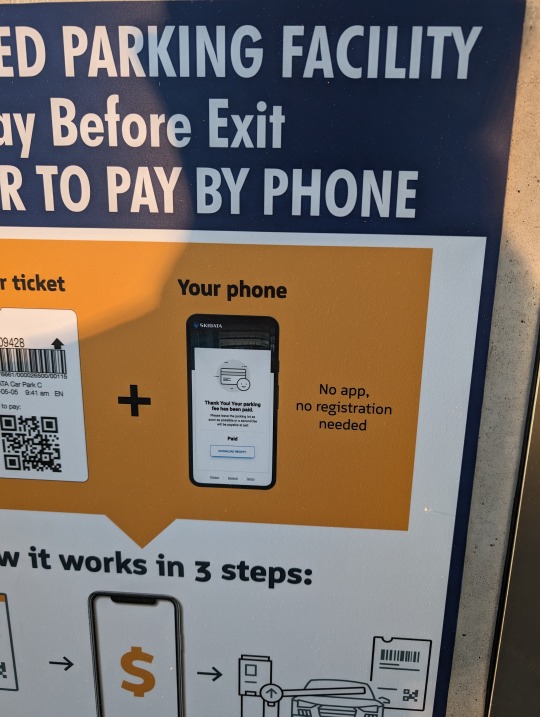
#avalon#catalina island#apps#app fatigue#account fatigue#surveillance#mobile#m-commerce#parking#consumer revolt#apps are crap#an app is a web page skinned with enough IP to felonize mods#privacy
271 notes
·
View notes
Text

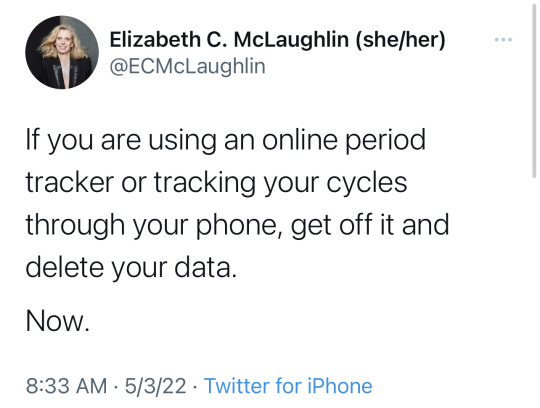
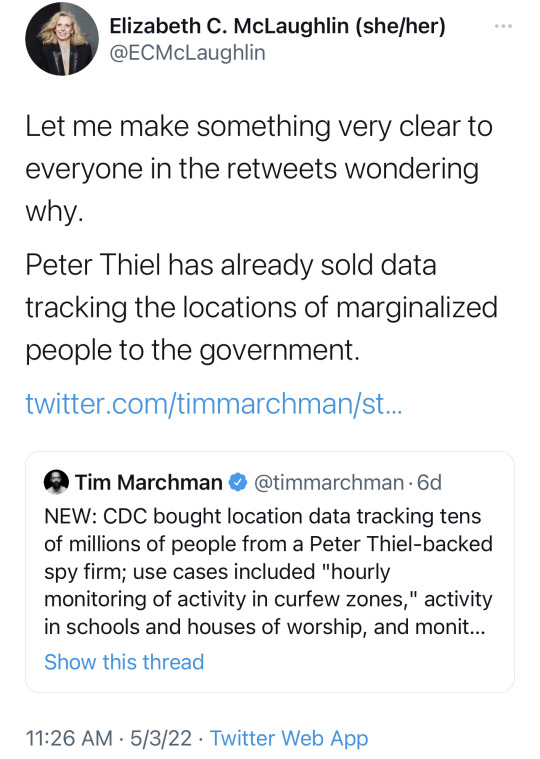
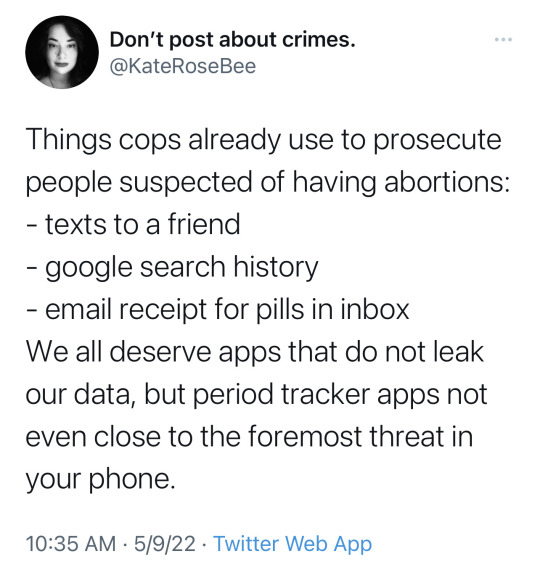

🗣Anyone using a period tracker app needs to very strongly consider deleting it. Not now, but RIGHT NOW!
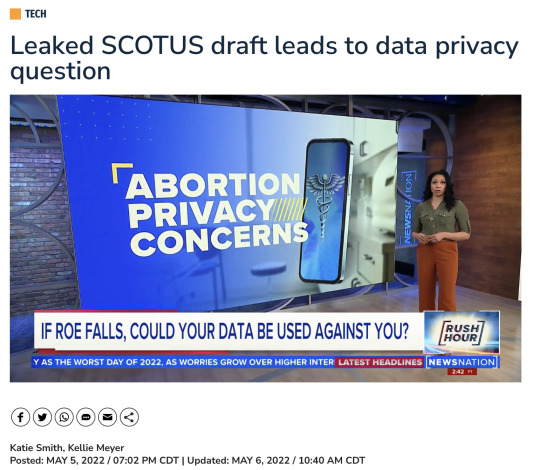
Your personal data that is being collected can and has already been mined and sold to marketing firms and law enforcement. You don’t need to be Margaret Atwood to imagine who your private information might be sold to, or what period-tracking data might be used for in a Republican state, or in a conservative court of law.
I really hate to sound alarmist, but this is Christofascist America in 2022, please protect yourself and act accordingly.
👉🏿 https://www.consumerreports.org/health-privacy/what-your-period-tracker-app-knows-about-you-a8701683935/
👉🏿 https://www.washingtonpost.com/technology/2022/05/04/abortion-digital-privacy/
👉🏿 https://www.newsnationnow.com/business/tech/abortion-data-privacy-question/
#politics#data mining#pregnancy tracking apps#privacy rights#roe v wade#abortion#womens rights#womens health#healthcare#reproductive rights#reproductive justice#feminism#womanism#scotus#surveillance state
5K notes
·
View notes
Text
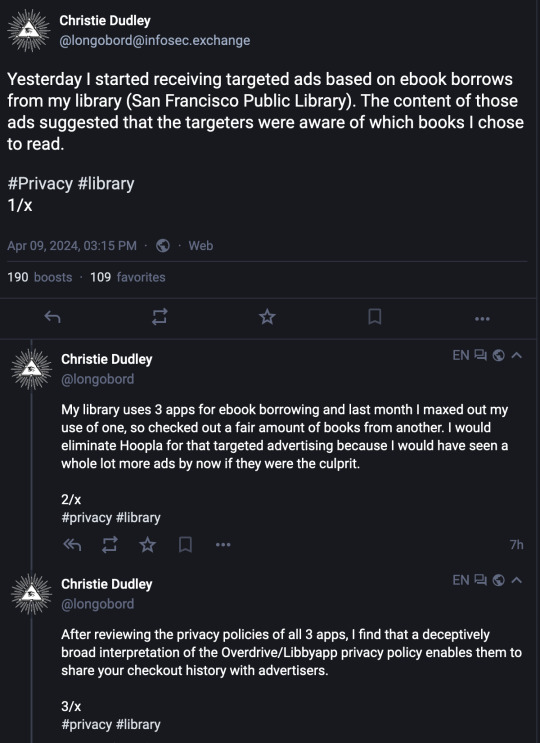

#libby#library#libraries#books#reading#privacy#source linked in reblog#idk if this has escaped mastodon yet#remember when people were afraid of enshitification because Overdrive was bought by one of those terrible private equity firms?#afaik the app itself hasn't gotten worse but this is in fact bad!
49 notes
·
View notes
Text
Discord App implementing AI based on your conversations and data
Apparently Discord is now doing sketchy AI shit.
Please spread this around so users are made aware of this change and how to combat it!

Why is it sketchy? Well because they're gonna scan and use your conversations and servers to feed the AI. This is a massive privacy breach if implemented in a way that automatically opts every user into this.
Not only that but also this upcoming change:

And how do you combat this? Well first off cancel Nitro, that's what got them to back off the NFT shit.
And second turn go to your Privacy and Safety settings and turn off all the Sharing options

332 notes
·
View notes
Text
grindr isn't the only company selling your HIV status
#scruff#jack'd#grindr#read the lack of privacy policy#queer#lgbqti#lgbt#gay app#gay#trans#bi#2018#2024
16 notes
·
View notes
Text
not tagging this because i have manners, but while there were absolutely a few people jumping on the wyllstarion train after patch 6 for the sake of "moral highground" like shipping is activism, pretending theres this shipping war going on thats so bloody you need to put that take in the tags is weak shit and you would not have survived any prior era of fandom culture. are the legions of aggressive wyll stans hellbent on ruining your fun in the room with us right now? the wyllstarion tag updates, like, 5x a day. you can literally just block all of us
#maybe im just on the chill side of the fandom (i love the block button) but ive literally never seen a wylls//tarion fan drink#haterade outside of the privacy of their own goddamn home#i bet it happens sometimes and i just dont see it but i can only CONFIRM it happens from the other direction#i am of course referring to a ship that starts with b and ends with eave#'why cant we just be peaceful with each other?' we.... are? outside of a handful of people on likely both sides?#obviously im drinking haterade rn (bitching about people bitching about 'ship wars') but its my post so its still my lane#sorry you saw a dumb tiktok but thats a different app and not my issue and also tiktok.#so.
17 notes
·
View notes
Text
I used to go on quotev all the time when j was 10/11 years old (i put ago on acciden. I am not that old. I was a small child then.), and I blame it to this day for the reason I turned out how I did
5th grade me had no business reading fanfics and taking sans au quizzes (the sleepover ones hold a special place in my heart (I kinda hate them)) on that site
#that site scares me#i kinda made a friends (?) with one writter on their because i loved one of her fics and would always comment on it tho so thst was cool#qoutev#THATS A TAG??#damn#i love vague posting my age in a way that makes it very obvious how old i am lkke. its so obvious reading my post/tags smtimes and uet#i never say it. amino instincts#i need to talk about amino so bad man#i made friends on that app. was expretemly unsafe abkut my privacy at 10/11 hears of age on that app#my first user name was (firstname)_(middlename) because i had no oncdpt of privacy and i actively gave away my age#girlie needed help back them#reese ranting about stupid shit
7 notes
·
View notes
Text
ill be deleting tumblr and a lot of other apps because my parents want to search through my phone so <3
#i have the site its fine#but all my social media apps will be gone#and i probably wont be online a lot because of it#ill see when they stop trying to get to know me by invading my privacy
26 notes
·
View notes
Text
my new home screen


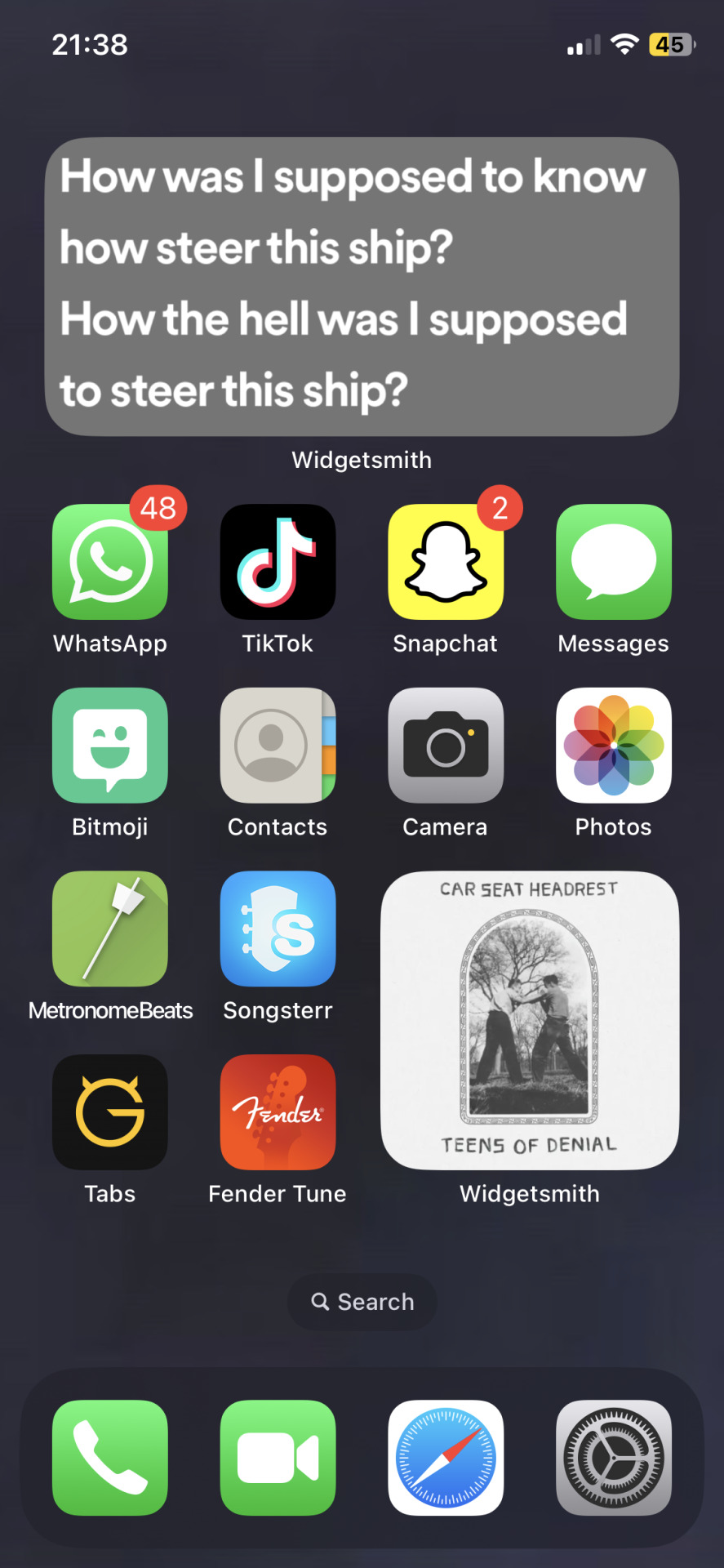

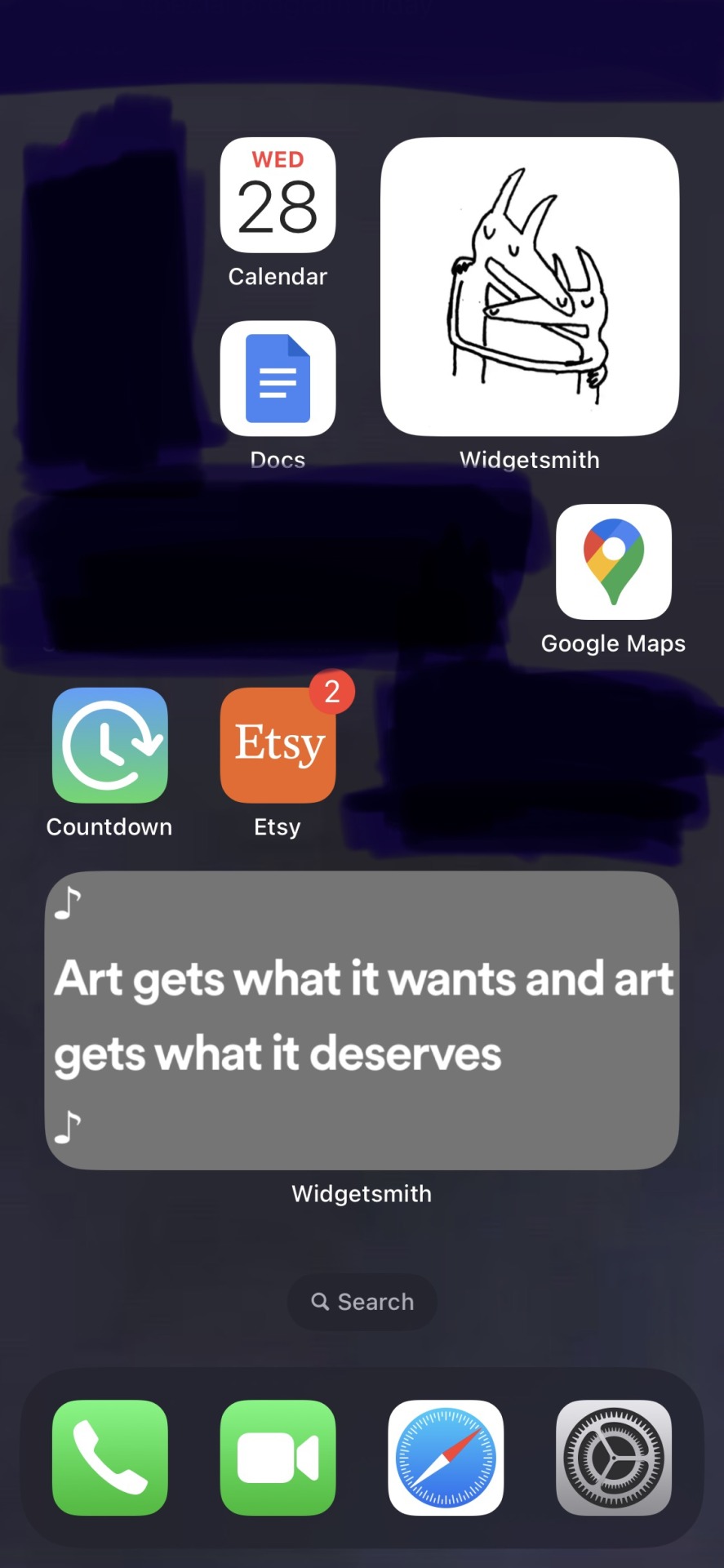
@lesbianchipbastard thought you might appreciate this too :3
7 notes
·
View notes
Text
this is so embarrassing but i downloaded pokemon sleep like three nights ago and um. i think its helping. like a lot djdkdld
#i am not staying up as late as i ordinarily would and i actually feel sort of rested at first when i wake up#the rested feeling wears off and i end up feeling fatigued like normal in like under an hour but STILL.#its so bonkers to wake up and not immediately feel like shit ??? idk when i last had this its ... rly nice fjfldl#its likely just placebo but I'll take it DHFJDLL#if i keep using it and if any mutuals use it too... perhaps we can exchange friend codes idk how that works fjfldl#idk if i will even wanna do that but MAYBE. feels kind of invasive potentially idk i havent made up my mind yet lol#also ik theres probably potential privacy concerns w the app itself but Im desperate for things that help w my sleep#i do a shit ton to protect my data everywhere else and at some point i just have to shrug and go oh well what can ya do#(what i could do is just... not have an app. thats tracking my sleep. LMAO. but like i said im desperate at this point dndkdl)#dandy.cmd
8 notes
·
View notes
Note
i think what's going on with that checkbox is that if you press the "find friends" button underneath it then it prompts you to ask if you want to sync with your contacts. if you have the box unchecked you can add your contacts that are synced, while if you have box checked it will allow your contacts to add you. trying to do it after declining to give discord permission to do that just has it ask again so i dont think they turned anything new on by default. (going into privacy settings and unticking the sync checkbox is a good idea tho)
yeahh that makes sense 😭😭😭 sorry the ui just really tripped me (and a good few thousand others who im in servers with who told me abt it in the first place) up ^^;;
thanks for setting the record straight i'll post a correction! altho atp idk how much it'll do since people keep adding onto it and not actually reading what others have said before and also. kinda relatedly. for the love of god. add image descriptions if you're gonna add pictures 😒
#also yeah privacy settings/permissions for apps is sth i always keep my eye on bc i just Do Not trust electronics atp 😭#answered#anonymous
9 notes
·
View notes
Text
The antitrust case against Apple
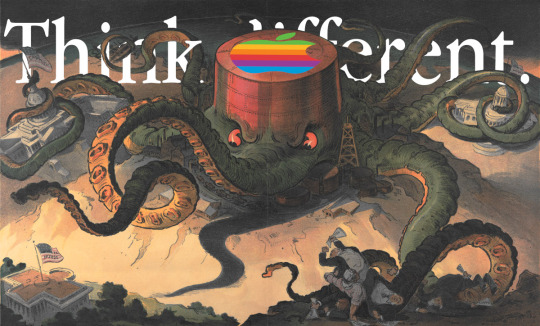
I'm on tour with my new, nationally bestselling novel The Bezzle! Catch me TONIGHT (Mar 22) in TORONTO, then SUNDAY (Mar 24) with LAURA POITRAS in NYC, then Anaheim, and beyond!

The foundational tenet of "the Cult of Mac" is that buying products from a $3t company makes you a member of an oppressed ethnic minority and therefore every criticism of that corporation is an ethnic slur:
https://pluralistic.net/2024/01/12/youre-holding-it-wrong/#if-dishwashers-were-iphones
Call it "Apple exceptionalism" – the idea that Apple, alone among the Big Tech firms, is virtuous, and therefore its conduct should be interpreted through that lens of virtue. The wellspring of this virtue is conveniently nebulous, which allows for endless goal-post shifting by members of the Cult of Mac when Apple's sins are made manifest.
Take the claim that Apple is "privacy respecting," which is attributed to Apple's business model of financing its services though cash transactions, rather than by selling it customers to advertisers. This is the (widely misunderstood) crux of the "surveillance capitalism" hypothesis: that capitalism is just fine, but once surveillance is in the mix, capitalism fails.
Apple, then, is said to be a virtuous company because its behavior is disciplined by market forces, unlike its spying rivals, whose ability to "hack our dopamine loops" immobilizes the market's invisible hand with "behavior-shaping" shackles:
http://pluralistic.net/HowToDestroySurveillanceCapitalism
Apple makes a big deal out of its privacy-respecting ethos, and not without some justification. After all, Apple went to the mattresses to fight the FBI when they tried to force Apple to introduced defects into its encryption systems:
https://www.eff.org/deeplinks/2018/04/fbi-could-have-gotten-san-bernardino-shooters-iphone-leadership-didnt-say
And Apple gave Ios users the power to opt out of Facebook spying with a single click; 96% of its customers took them up on this offer, costing Facebook $10b (one fifth of the pricetag of the metaverse boondoggle!) in a single year (you love to see it):
https://arstechnica.com/gadgets/2021/02/facebook-makes-the-case-for-activity-tracking-to-ios-14-users-in-new-pop-ups/
Bruce Schneier has a name for this practice: "feudal security." That's when you cede control over your device to a Big Tech warlord whose "walled garden" becomes a fortress that defends you against external threats:
https://pluralistic.net/2021/06/08/leona-helmsley-was-a-pioneer/#manorialism
The keyword here is external threats. When Apple itself threatens your privacy, the fortress becomes a prison. The fact that you can't install unapproved apps on your Ios device means that when Apple decides to harm you, you have nowhere to turn. The first Apple customers to discover this were in China. When the Chinese government ordered Apple to remove all working privacy tools from its App Store, the company obliged, rather than risk losing access to its ultra-cheap manufacturing base (Tim Cook's signal accomplishment, the one that vaulted him into the CEO's seat, was figuring out how to offshore Apple manufacturing to China) and hundreds of millions of middle-class consumers:
https://www.reuters.com/article/us-china-apple-vpn/apple-says-it-is-removing-vpn-services-from-china-app-store-idUSKBN1AE0BQ
Killing VPNs and other privacy tools was just for openers. After Apple caved to Beijing, the demands kept coming. Next, Apple willingly backdoored all its Chinese cloud services, so that the Chinese state could plunder its customers' data at will:
https://www.nytimes.com/2021/05/17/technology/apple-china-censorship-data.html
This was the completely foreseeable consequence of Apple's "curated computing" model: once the company arrogated to itself the power to decide which software you could run on your own computer, it was inevitable that powerful actors – like the Chinese Communist Party – would lean on Apple to exercise that power in service to its goals.
Unsurprisingly, the Chinese state's appetite for deputizing Apple to help with its spying and oppression was not sated by backdooring iCloud and kicking VPNs out of the App Store. As recently as 2022, Apple continued to neuter its tools at the behest of the Chinese state, breaking Airdrop to make it useless for organizing protests in China:
https://pluralistic.net/2022/11/11/foreseeable-consequences/#airdropped
But the threat of Apple turning on its customers isn't limited to China. While the company has been unwilling to spy on its users on behalf of the US government, it's proven more than willing to compromise its worldwide users' privacy to pad its own profits. Remember when Apple let its users opt out of Facebook surveillance with one click? At the very same time, Apple was spinning up its own commercial surveillance program, spying on Ios customers, gathering the very same data as Facebook, and for the very same purpose: to target ads. When it came to its own surveillance, Apple completely ignored its customers' explicit refusal to consent to spying, spied on them anyway, and lied about it:
https://pluralistic.net/2022/11/14/luxury-surveillance/#liar-liar
Here's the thing: even if you believe that Apple has a "corporate personality" that makes it want to do the right thing, that desire to be virtuous is dependent on the constraints Apple faces. The fact that Apple has complete legal and technical control over the hardware it sells – the power to decide who can make software that runs on that hardware, the power to decide who can fix that hardware, the power to decide who can sell parts for that hardware – represents an irresistible temptation to enshittify Apple products.
"Constraints" are the crux of the enshittification hypothesis. The contagion that spread enshittification to every corner of our technological world isn't a newfound sadism or indifference among tech bosses. Those bosses are the same people they've always been – the difference is that today, they are unconstrained.
Having bought, merged or formed a cartel with all their rivals, they don't fear competition (Apple buys 90+ companies per year, and Google pays it an annual $26.3b bribe for default search on its operating systems and programs).
Having captured their regulators, they don't fear fines or other penalties for cheating their customers, workers or suppliers (Apple led the coalition that defeated dozens of Right to Repair bills, year after year, in the late 2010s).
Having wrapped themselves in IP law, they don't fear rivals who make alternative clients, mods, privacy tools or other "adversarial interoperability" tools that disenshittify their products (Apple uses the DMCA, trademark, and other exotic rules to block third-party software, repair, and clients).
True virtue rests not merely in resisting temptation to be wicked, but in recognizing your own weakness and avoiding temptation. As I wrote when Apple embarked on its "curated computing" path, the company would eventually – inevitably – use its power to veto its customers' choices to harm those customers:
https://memex.craphound.com/2010/04/01/why-i-wont-buy-an-ipad-and-think-you-shouldnt-either/
Which is where we're at today. Apple – uniquely among electronics companies – shreds every device that is traded in by its customers, to block third parties from harvesting working components and using them for independent repair:
https://www.vice.com/en/article/yp73jw/apple-recycling-iphones-macbooks
Apple engraves microscopic Apple logos on those parts and uses these as the basis for trademark complaints to US customs, to block the re-importation of parts that escape its shredders:
https://repair.eu/news/apple-uses-trademark-law-to-strengthen-its-monopoly-on-repair/
Apple entered into an illegal price-fixing conspiracy with Amazon to prevent used and refurbished devices from being sold in the "world's biggest marketplace":
https://pluralistic.net/2022/11/10/you-had-one-job/#thats-just-the-as
Why is Apple so opposed to independent repair? Well, they say it's to keep users safe from unscrupulous or incompetent repair technicians (feudal security). But when Tim Cook speaks to his investors, he tells a different story, warning them that the company's profits are threatened by customers who choose to repair (rather than replace) their slippery, fragile glass $1,000 pocket computers (the fortress becomes a prison):
https://www.apple.com/newsroom/2019/01/letter-from-tim-cook-to-apple-investors/
All this adds up to a growing mountain of immortal e-waste, festooned with miniature Apple logos, that our descendants will be dealing with for the next 1,000 years. In the face of this unspeakable crime, Apple engaged in a string of dishonest maneuvers, claiming that it would support independent repair. In 2022, Apple announced a home repair program that turned out to be a laughably absurd con:
https://pluralistic.net/2022/05/22/apples-cement-overshoes/
Then in 2023, Apple announced a fresh "pro-repair" initiative that, once again, actually blocked repair:
https://pluralistic.net/2023/09/22/vin-locking/#thought-differently
Let's pause here a moment and remember that Apple once stood for independent repair, and celebrated the independent repair technicians that kept its customers' beloved Macs running:
https://pluralistic.net/2021/10/29/norwegian-potato-flour-enchiladas/#r2r
Whatever virtue lurks in Apple's corporate personhood, it is no match for the temptation that comes from running a locked-down platform designed to capture IP rights so that it can prevent normal competitive activities, like fixing phones, processing payments, or offering apps.
When Apple rolled out the App Store, Steve Jobs promised that it would save journalism and other forms of "content creation" by finally giving users a way to pay rightsholders. A decade later, that promise has been shattered by the app tax – a 30% rake on every in-app transaction that can't be avoided because Apple will kick your app out of the App Store if you even mention that your customers can pay you via the web in order to avoid giving a third of their content dollars to a hardware manufacturer that contributed nothing to the production of that material:
https://www.eff.org/deeplinks/2023/06/save-news-we-must-open-app-stores
Among the apps that Apple also refuses to allow on Ios is third-party browsers. Every Iphone browser is just a reskinned version of Apple's Safari, running on the same antiquated, insecure Webkit browser engine. The fact that Webkit is incomplete and outdated is a feature, not a bug, because it lets Apple block web apps – apps delivered via browsers, rather than app stores:
https://pluralistic.net/2022/12/13/kitbashed/#app-store-tax
Last month, the EU took aim at Apple's veto over its users' and software vendors' ability to transact with one another. The newly in-effect Digital Markets Act requires Apple to open up both third-party payment processing and third-party app stores. Apple's response to this is the very definition of malicious compliance, a snake's nest of junk-fees, onerous terms of service, and petty punitive measures that all add up to a great, big "Go fuck yourself":
https://pluralistic.net/2024/02/06/spoil-the-bunch/#dma
But Apple's bullying, privacy invasion, price-gouging and environmental crimes are global, and the EU isn't the only government seeking to end them. They're in the firing line in Japan:
https://asia.nikkei.com/Business/Technology/Japan-to-crack-down-on-Apple-and-Google-app-store-monopolies
And in the UK:
https://www.gov.uk/government/news/cma-wins-appeal-in-apple-case
And now, famously, the US Department of Justice is coming for Apple, with a bold antitrust complaint that strikes at the heart of Apple exceptionalism, the idea that monopoly is safer for users than technological self-determination:
https://www.justice.gov/opa/media/1344546/dl?inline
There's passages in the complaint that read like I wrote them:
Apple wraps itself in a cloak of privacy, security, and consumer preferences to justify its anticompetitive conduct. Indeed, it spends billions on marketing and branding to promote the self-serving premise that only Apple can safeguard consumers’ privacy and security interests. Apple selectively compromises privacy and security interests when doing so is in Apple’s own financial interest—such as degrading the security of text messages, offering governments and certain companies the chance to access more private and secure versions of app stores, or accepting billions of dollars each year for choosing Google as its default search engine when more private options are available. In the end, Apple deploys privacy and security justifications as an elastic shield that can stretch or contract to serve Apple’s financial and business interests.
After all, Apple punishes its customers for communicating with Android users by forcing them to do so without any encryption. When Beeper Mini rolled out an Imessage-compatible Android app that fixed this, giving Iphone owners the privacy Apple says they deserve but denies to them, Apple destroyed Beeper Mini:
https://blog.beeper.com/p/beeper-moving-forward
Tim Cook is on record about this: if you want to securely communicate with an Android user, you must "buy them an Iphone":
https://www.theverge.com/2022/9/7/23342243/tim-cook-apple-rcs-imessage-android-iphone-compatibility
If your friend, family member or customer declines to change mobile operating systems, Tim Cook insists that you must communicate without any privacy or security.
Even where Apple tries for security, it sometimes fails ("security is a process, not a product" -B. Schneier). To be secure in a benevolent dictatorship, it must also be an infallible dictatorship. Apple's far from infallible: Eight generations of Iphones have unpatchable hardware defects:
https://checkm8.info/
And Apple's latest custom chips have secret-leaking, unpatchable vulnerabilities:
https://arstechnica.com/security/2024/03/hackers-can-extract-secret-encryption-keys-from-apples-mac-chips/
Apple's far from infallible – but they're also far from benevolent. Despite Apple's claims, its hardware, operating system and apps are riddled with deliberate privacy defects, introduce to protect Apple's shareholders at the expense of its customers:
https://proton.me/blog/iphone-privacy
Now, antitrust suits are notoriously hard to make, especially after 40 years of bad-precedent-setting, monopoly-friendly antitrust malpractice. Much of the time, these suits fail because they can't prove that tech bosses intentionally built their monopolies. However, tech is a written culture, one that leaves abundant, indelible records of corporate deliberations. What's more, tech bosses are notoriously prone to bragging about their nefarious intentions, committing them to writing:
https://pluralistic.net/2023/09/03/big-tech-cant-stop-telling-on-itself/
Apple is no exception – there's an abundance of written records that establish that Apple deliberately, illegally set out to create and maintain a monopoly:
https://www.wired.com/story/4-internal-apple-emails-helped-doj-build-antitrust-case/
Apple claims that its monopoly is beneficent, used to protect its users, making its products more "elegant" and safe. But when Apple's interests conflict with its customers' safety and privacy – and pocketbooks – Apple always puts itself first, just like every other corporation. In other words: Apple is unexceptional.
The Cult of Mac denies this. They say that no one wants to use a third-party app store, no one wants third-party payments, no one wants third-party repair. This is obviously wrong and trivially disproved: if no Apple customer wanted these things, Apple wouldn't have to go to enormous lengths to prevent them. The only phones that an independent Iphone repair shop fixes are Iphones: which means Iphone owners want independent repair.
The rejoinder from the Cult of Mac is that those Iphone owners shouldn't own Iphones: if they wanted to exercise property rights over their phones, they shouldn't have bought a phone from Apple. This is the "No True Scotsman" fallacy for distraction-rectangles, and moreover, it's impossible to square with Tim Cook's insistence that if you want private communications, you must buy an Iphone.
Apple is unexceptional. It's just another Big Tech monopolist. Rounded corners don't preserve virtue any better than square ones. Any company that is freed from constraints – of competition, regulation and interoperability – will always enshittify. Apple – being unexceptional – is no exception.

Name your price for 18 of my DRM-free ebooks and support the Electronic Frontier Foundation with the Humble Cory Doctorow Bundle.

If you'd like an essay-formatted version of this post to read or share, here's a link to it on pluralistic.net, my surveillance-free, ad-free, tracker-free blog:
https://pluralistic.net/2024/03/22/reality-distortion-field/#three-trillion-here-three-trillion-there-pretty-soon-youre-talking-real-money
#pluralistic#apple#antitrust#cult of mac#ios#mobile#app tax#infosec#feudal security#doj#jonathan kanter#doj v apple#big tech#trustbusting#monopolies#app stores#technofeudalism#technomaorialism#privacy#right to repair#corruption
232 notes
·
View notes
Text


Sen. Ed Markey (D-Mass.) sent a letter Tuesday to the Department of Homeland Security (DHS) urging it to discontinue the use of a smartphone app required by migrants seeking asylum at the southern border to use.
The CBP One app, which was rolled out in 2021, was established to allow migrants to submit applications for asylum before they cross the U.S. border. Markey said in his letter that requiring migrants to submit sensitive information, including biometric and location data, on the app raises “serious privacy concerns,” and demanded that the DHS cease its use of it.
“This expanded use of the CBP One app raises troubling issues of inequitable access to — and impermissible limits on — asylum, and has been plagued by significant technical problems and privacy concerns. DHS should shelve the CBP One app immediately,” Markey said in his letter.
“Rather than mandating use of an app that is inaccessible to many migrants, and violates both their privacy and international law, DHS should instead implement a compassionate, lawful, and human rights centered approach for those seeking asylum in the United States,” he continued.
He said that the use of this technology has also faced technical problems, including with its facial recognition software misidentifying people of color.
“Technology can facilitate asylum processing, but we cannot allow it to create a tiered system that treats asylum seekers differently based on their economic status — including the ability to pay for travel — language, nationality, or race,” he said.
The app has negative ratings on both the Google Play and Apple app stores, with many users criticizing the app for crashing and other technical issues.
(continue reading)
#politics#ed markey#immigration#asylum seekers#joe biden#cbp one app#dhs#privacy rights#surveillance state#facial recognition
54 notes
·
View notes